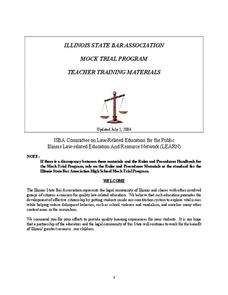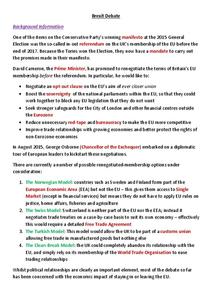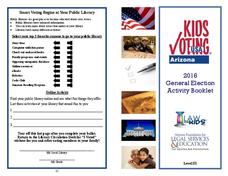USA.gov
Three Branches of Government
Here is a very simple handout that illustrates how the Constitution provides for a separation of powers between the legislative, executive, and judicial branches.
Humanities Texas
Primary Source Worksheet: Theodore Roosevelt, Excerpt from Inaugural Address
"Much has been given us, and much will rightfully be expected from us." As part of a series of worksheets that provide readers with an opportunity to develop their primary source comprehension skills, kids examine an excerpt from...
Practical Action
Moja Island
Did you know that 1.3 billion people live without any form of electricity? Discover an array of possible renewable energy options by taking a trip to Moja Island, an online learning resource that will equip you and your...
Illinois State Bar Association
Mock Trial Teacher Training
Whether you are new to the mock trial format or have extensive experience with the program, you'll find much to learn from this teacher training manual that includes strategies for teaching the various aspects of court room trials.
Amazon Web Services
Brexit Debate
Should we stay or should we go? Class members debate whether Britain should exit the European Union. While the resource predates the exit vote, the materials provide class members with an opportunity to explore some of the many...
School Improvement in Maryland
Analysis of Marbury v. Madison
Should the United States Supreme Court have the power of judicial review? Instructors guide class members through a review of Marbury v. Madison and assist class members in writing a brief of the case. As independent practice,...
Constitution Facts
U.S. Constitution Crossword Puzzles: Basic #1
Reinforce U.S. Constitution facts with a crossword puzzle. Scholars show what they know by completing the 53 prompts.
Brown University
The Candidates and Their Values: Election 2016
Voting for the next president of the United States is about finding the candidate who most closely aligns with your own values and sense of democracy. High schoolers become acquainted with the candidates from the 2016 election with a...
Freeology
Martin Luther King, Jr.'s "I Have a Dream"
Dr. Martin Luther King, Jr.'s speech "I Have A Dream" is hailed as one of the most eloquent and moving speeches of the 20th century. But what makes his words hit his listeners' ears in just the right ways? Young orators study Dr. King's...
Law for Kids
General Election Activity Booklet
It's never too early to practice smart voting! Gain practice voting in a general election using a booklet compiled of an assortment of activities including a word search, maze, graphing, and more!
Administrative Office of the US Courts
Cox v. New Hampshire
Staging a debate is a great way to class members to think deeply about issues, especially those related to rights guaranteed by the US Constitution. The Supreme Court case, Cox V. New Hampshire, focuses on the First Amendment's...
Stanford University
Martin Luther King, Jr. and Malcolm X: A Common Solution?
Much has been made of the differences between Martin Luther King, Jr. and Malcolm X. But was there any common ground between them? Class members reconsider what they think they know about these two civil rights leaders with...
Civil Rights Movement Veterans
Timeline of Events: 1960’s Civil Rights Movement of St. Augustine, Florida
A timeline can be a powerful learning tool because it reveals a pattern in events. While few would consider St. Augustine, Florida a hotbed of the 1960s Civil Rights Movement, a selection of background information and a timeline of...
Facing History and Ourselves
How Should We Remember?
We must remember the past in order to avoid its mistakes. Young historians analyze the importance of historical remembrance using primary and secondary documents, as well as video clips. They then study the creation of a World War...
Teaching for Change
A Documents-Based Lesson on the Voting Rights Act
How did the Voting Rights Act affect the daily lives of American citizens? A document-based lesson developed by the Student Non-Violent Coordinating committee (SNCC) presents a case study of the impact of the Voting Rights Act of 1965 on...
Deliberating in a Democracy
Crime and Punishment
Should the United States ban the death penalty? Scholars use real-life examples of criminal activity to come to their own conclusions on the death penalty. Primary source documents, as well as video clips, open the issue of capital...
Amnesty International
Respect My Rights, Respect My Dignity Module Three – Sexual and Reproductive Rights Are Human Rights
Give learners the support they need to take action in their communities when it comes to sexual and reproductive rights. A resource teaches the class about global issues surrounding gender inequality, including both readings and...
Annenberg Foundation
America's History in the Making: Classroom Applications Four
The final installment of a 22-part American history series examines the many faces that make up the country's story. From Henry Ford to Tulio Serrano, scholars use biographical evidence and Internet research to uncover the people behind...
State Bar of Texas
Plessy v. Ferguson
Where did separate but equal originate and what does it mean? Scholars investigate the Supreme Court Case Plessy v. Ferguson. Using a short video clip, they analyze the impact the decision of legal segregation had on society in 1896....
State Bar of Texas
Schenck v. US
Freedom of speech is absolute—or is it? The Supreme Court case Schenck v. United States has learners research what free speech really looks like. A short video along with paired work creates open discussion and thought on what speech is...
Federal Judicial Center
Amistad and Dred Scott—a Comparative Activity
What do slaves fighting for their freedom on board a ship and a slave fighting for his freedom in a courtroom have in common? Budding historians investigate the two different cases of the Amistad slave revolt and the Dred Scott argument....
State Bar of Texas
Marbury v. Madison
Who has the final say in matters dealing with the rules under the United States Constitution? The case Marbury v. Madison brings to light the issue of judicial review. Learners investigate the Supreme Court's opinion in the case with a...
State Bar of Texas
Mapp v. Ohio
Do you have a search warrant? Scholars investigate the concept of illegal search and seizure through the eyes of the Supreme Court case Mapp v. Ohio. A short video clip along with paired group work opens discussion on the concept of how...
Echoes & Reflections
Contemporary Antisemitism
Despite the recognized atrocities of the Holocaust, anti-semitism continues. The 11th and final installment of the Teaching the Holocaust series explores the long-term effects of the Holocaust on modern anti-semitism, asking pupils to...

























